| dc.contributor.author | Kundt, Thorben | |
| dc.date.accessioned | 2018-06-29T09:45:21Z | |
| dc.date.available | 2018-06-29T09:45:21Z | |
| dc.date.issued | 2017-10 | |
| dc.identifier.citation | Kundt, T.C. (2017) Opportunities and Challenges for Taxing the Informal Economy and Subnational Taxation, K4D Emerging Issues Report. Brighton, UK: Institute of Development Studies | en |
| dc.identifier.uri | https://opendocs.ids.ac.uk/opendocs/handle/20.500.12413/13836 | |
| dc.description.abstract | To date, international support to taxation and domestic revenue mobilisation has been rather strongly focused on the national level. For instance, DFID’s centrally managed programmes, and HMRC’s capacity work, have considered national taxation collected by a central revenue authority. However, there might be some compelling arguments to extent support to levels others than the national level. This report considers two distinct areas: (1) the informal sector (which is, by definition, outside of the national economy), and (2) the subnational level. In particular, the report focuses on the revenue, growth and governance implications of taxation in these areas and provides some recent experience from developing countries. | en |
| dc.language.iso | en | en |
| dc.publisher | Institute of Development Studies | en |
| dc.relation.ispartofseries | K4D Emerging Issues report; | |
| dc.rights.uri | https://www.nationalarchives.gov.uk/doc/open-government-licence/version/3/ | en |
| dc.subject | Economic Development | en |
| dc.subject | Finance | en |
| dc.title | Opportunities and Challenges for Taxing the Informal Economy and Subnational Taxation | en |
| dc.type | Other | en |
| dc.rights.holder | DFID | en |
| dcterms.dateAccepted | 2017-10 | |
| rioxxterms.funder | Default funder | en |
| rioxxterms.identifier.project | K4D | en |
| rioxxterms.version | NA | en |
| rioxxterms.funder.project | 0986883a-6d0f-4bb8-9c46-5e0682934d65 | en |

